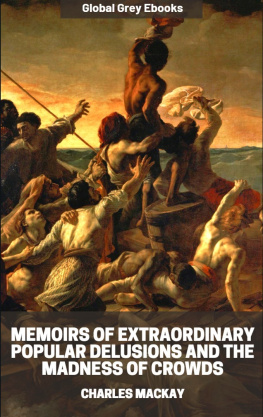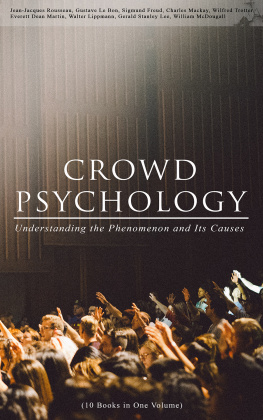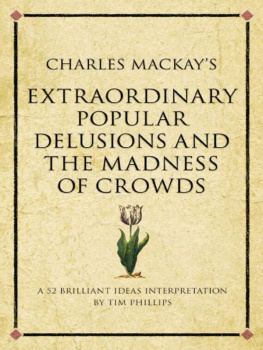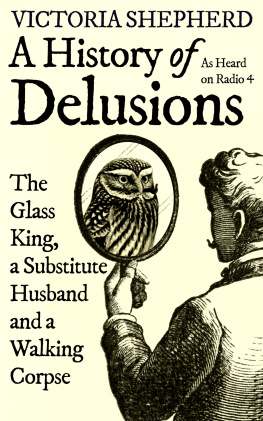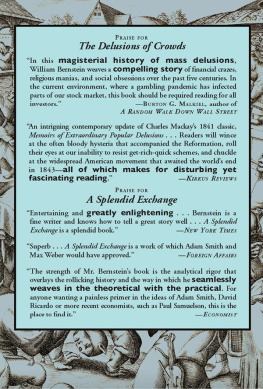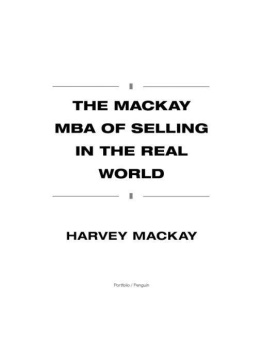Charles Mackay - Memoirs of Extraordinary Popular Delusions and the Madness of Crowds
Here you can read online Charles Mackay - Memoirs of Extraordinary Popular Delusions and the Madness of Crowds full text of the book (entire story) in english for free. Download pdf and epub, get meaning, cover and reviews about this ebook. year: 2021, publisher: Global Grey, genre: Detective and thriller. Description of the work, (preface) as well as reviews are available. Best literature library LitArk.com created for fans of good reading and offers a wide selection of genres:
Romance novel
Science fiction
Adventure
Detective
Science
History
Home and family
Prose
Art
Politics
Computer
Non-fiction
Religion
Business
Children
Humor
Choose a favorite category and find really read worthwhile books. Enjoy immersion in the world of imagination, feel the emotions of the characters or learn something new for yourself, make an fascinating discovery.
- Book:Memoirs of Extraordinary Popular Delusions and the Madness of Crowds
- Author:
- Publisher:Global Grey
- Genre:
- Year:2021
- Rating:4 / 5
- Favourites:Add to favourites
- Your mark:
- 80
- 1
- 2
- 3
- 4
- 5
Memoirs of Extraordinary Popular Delusions and the Madness of Crowds: summary, description and annotation
We offer to read an annotation, description, summary or preface (depends on what the author of the book "Memoirs of Extraordinary Popular Delusions and the Madness of Crowds" wrote himself). If you haven't found the necessary information about the book — write in the comments, we will try to find it.
Charles Mackay: author's other books
Who wrote Memoirs of Extraordinary Popular Delusions and the Madness of Crowds? Find out the surname, the name of the author of the book and a list of all author's works by series.
Memoirs of Extraordinary Popular Delusions and the Madness of Crowds — read online for free the complete book (whole text) full work
Below is the text of the book, divided by pages. System saving the place of the last page read, allows you to conveniently read the book "Memoirs of Extraordinary Popular Delusions and the Madness of Crowds" online for free, without having to search again every time where you left off. Put a bookmark, and you can go to the page where you finished reading at any time.
Font size:
Interval:
Bookmark:
By Charles Mackay.
This free ebook edition was created and published by Global Grey

GlobalGrey 2021
globalgreyebooks.com
N'en deplaise a ces fous nommes sages de Grece;
En ce monde il n'est point de parfaite sagesse;
Tous les hommes sont fous, et malgre tous leurs soins,
Ne different entre eux que du plus ou du moins.
BOILEAU.
In reading the history of nations, we find that, like individuals, they have their whims and their peculiarities; their seasons of excitement and recklessness, when they care not what they do. We find that whole communities suddenly fix their minds upon one object, and go mad in its pursuit; that millions of people become simultaneously impressed with one delusion, and run after it, till their attention is caught by some new folly more captivating than the first. We see one nation suddenly seized, from its highest to its lowest members, with a fierce desire of military glory; another as suddenly becoming crazed upon a religious scruple, and neither of them recovering its senses until it has shed rivers of blood and sowed a harvest of groans and tears, to be reaped by its posterity. At an early age in the annals of Europe its population lost their wits about the Sepulchre of Jesus, and crowded in frenzied multitudes to the Holy Land: another age went mad for fear of the Devil, and offered up hundreds of thousands of victims to the delusion of witchcraft. At another time, the many became crazed on the subject of the Philosopher's Stone, and committed follies till then unheard of in the pursuit. It was once thought a venial offence in very many countries of Europe to destroy an enemy by slow poison. Persons who would have revolted at the idea of stabbing a man to the heart, drugged his pottage without scruple. Ladies of gentle birth and manners caught the contagion of murder, until poisoning, under their auspices, became quite fashionable. Some delusions, though notorious to all the world, have subsisted for ages, flourishing as widely among civilized and polished nations as among the early barbarians with whom they originated,that of duelling, for instance, and the belief in omens and divination of the future, which seem to defy the progress of knowledge to eradicate entirely from the popular mind. Money, again, has often been a cause of the delusion of multitudes. Sober nations have all at once become desperate gamblers, and risked almost their existence upon the turn of a piece of paper. To trace the history of the most prominent of these delusions is the object of the present pages. Men, it has been well said, think in herds; it will be seen that they go mad in herds, while they only recover their senses slowly, and one by one.
In the present state of civilization, society has often shown itself very prone to run a career of folly from the last-mentioned cases. This infatuation has seized upon whole nations in a most extraordinary manner. France, with her Mississippi madness, set the first great example, and was very soon imitated by England with her South Sea Bubble. At an earlier period, Holland made herself still more ridiculous in the eyes of the world, by the frenzy which came over her people for the love of Tulips. Melancholy as all these delusions were in their ultimate results, their history is most amusing. A more ludicrous and yet painful spectacle, than that which Holland presented in the years 1635 and 1636, or France in 1719 and 1720, can hardly be imagined. Taking them in the order of their importance, we shall commence our history with John Law and the famous Mississippi scheme of the years above mentioned.
Some in clandestine companies combine;
Erect new stocks to trade beyond the line;
With air and empty names beguile the town,
And raise new credits first, then cry 'em down;
Divide the empty nothing into shares,
And set the crowd together by the ears.
Defoe.
The personal character and career of one man are so intimately connected with the great scheme of the years 1719 and 1720, that a history of the Mississippi madness can have no fitter introduction than a sketch of the life of its great author, John Law. Historians are divided in opinion as to whether they should designate him a knave or a madman. Both epithets were unsparingly applied to him in his lifetime, and while the unhappy consequences of his projects were still deeply felt. Posterity, however, has found reason to doubt the justice of the accusation, and to confess that John Law was neither knave nor madman, but one more deceived than deceiving; more sinned against than sinning. He was thoroughly acquainted with the philosophy and true principles of credit. He understood the monetary question better than any man of his day; and if his system fell with a crash so tremendous, it was not so much his fault as that of the people amongst whom he had erected it. He did not calculate upon the avaricious frenzy of a whole nation; he did not see that confidence, like mistrust, could be increased, almost ad infinitum, and that hope was as extravagant as fear. How was he to foretell that the French people, like the man in the fable, would kill, in their frantic eagerness, the fine goose he had brought to lay them so many golden eggs? His fate was like that which may be supposed to have overtaken the first adventurous boatman who rowed from Erie to Ontario. Broad and smooth was the river on which he embarked; rapid and pleasant was his progress; and who was to stay him in his career? Alas for him! the cataract was nigh. He saw, when it was too late, that the tide which wafted him so joyously along was a tide of destruction; and when he endeavoured to retrace his way, he found that the current was too strong for his weak efforts to stem, and that he drew nearer every instant to the tremendous falls. Down he went over the sharp rocks, and the waters with him. He was dashed to pieces with his bark, but the waters, maddened and turned to foam by the rough descent, only boiled and bubbled for a time, and then flowed on again as smoothly as ever. Just so it was with Law and the French people. He was the boatman and they were the waters.
John Law was born at Edinburgh in the year 1671. His father was the younger son of an ancient family in Fife, and carried on the business of a goldsmith and banker. He amassed considerable wealth in his trade, sufficient to enable him to gratify the wish, so common among his countrymen, of adding a territorial designation to his name. He purchased with this view the estates of Lauriston and Randleston, on the Frith of Forth on the borders of West and Mid Lothian, and was thenceforth known as Law of Lauriston. The subject of our memoir, being the eldest son, was received into his father's counting-house at the age of fourteen, and for three years laboured hard to acquire an insight into the principles of banking, as then carried on in Scotland. He had always manifested great love for the study of numbers, and his proficiency in the mathematics was considered extraordinary in one of his tender years. At the age of seventeen he was tall, strong, and well made; and his face, although deeply scarred with the small-pox, was agreeable in its expression, and full of intelligence. At this time he began to neglect his business, and becoming vain of his person, indulged in considerable extravagance of attire. He was a great favourite with the ladies, by whom he was called Beau Law, while the other sex, despising his foppery, nicknamed him Jessamy John. At the death of his father, which happened in 1688, he withdrew entirely from the desk, which had become so irksome, and being possessed of the revenues of the paternal estate of Lauriston, he proceeded to London, to see the world.
Font size:
Interval:
Bookmark:
Similar books «Memoirs of Extraordinary Popular Delusions and the Madness of Crowds»
Look at similar books to Memoirs of Extraordinary Popular Delusions and the Madness of Crowds. We have selected literature similar in name and meaning in the hope of providing readers with more options to find new, interesting, not yet read works.
Discussion, reviews of the book Memoirs of Extraordinary Popular Delusions and the Madness of Crowds and just readers' own opinions. Leave your comments, write what you think about the work, its meaning or the main characters. Specify what exactly you liked and what you didn't like, and why you think so.

